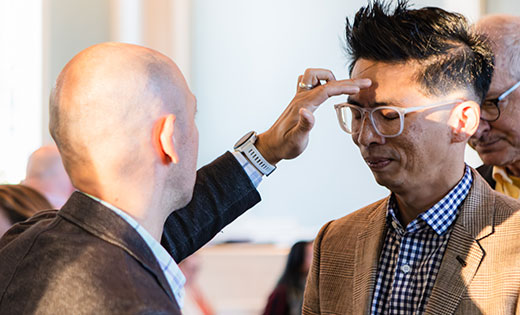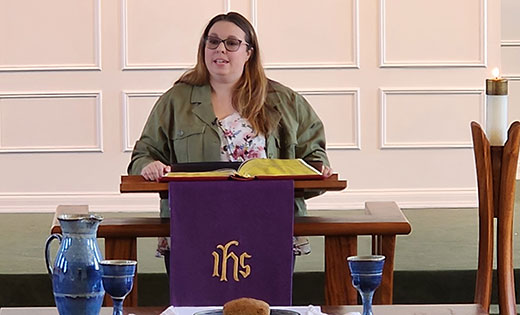Pittsburgh Theological Seminary Receives $1M LIlly Grant to Launch Ignite: Microcredentials for Ministry
 Pittsburgh Theological Seminary has received a grant of $1 million from Lilly Endowment Inc. to help launch Ignite: Microcredentials for Ministry, a bold new initiative to form and equip Christian lay leaders for pastoral ministry through competency-based theological education.
Pittsburgh Theological Seminary has received a grant of $1 million from Lilly Endowment Inc. to help launch Ignite: Microcredentials for Ministry, a bold new initiative to form and equip Christian lay leaders for pastoral ministry through competency-based theological education.
The program is being funded through Lilly Endowment’s Pathways for Tomorrow Initiative, which is intended to help theological schools across the United States and Canada strengthen their educational and financial capacities to prepare and support pastoral leaders for Christian congregations both now and into the future.
Developed in close partnership with regional and ecumenical judicatories, the Ignite: Microcredentials for Ministry Program offers accessible, affordable, competency-based theological education to address the growing need for pastoral leadership in small and rural congregations that can no longer support full-time ordained clergy. Through a tiered structure—Ready, Effective, and Fruitful—participants gain essential ministry knowledge, contextual skills, and spiritual maturity via online coursework, mentoring, and practical application.
“Ignite expands the Seminary’s capacity to form capable, confident, and theologically grounded leaders to meet the changing needs of the 21st-century church,” said the Rev. Dr. Asa J. Lee, president of Pittsburgh Theological Seminary. “Through accessible, practical theological education, we’re empowering a new generation of lay and part-time leaders to serve faithfully and effectively in congregations that are vital to the future of the Church but often underserved. This initiative reflects our deep commitment to innovation, collaboration, and the ongoing call to prepare God’s people for ministry in every context.”
 Pittsburgh Theological Seminary is one of 163 theological schools that have received grants since 2021 through the Pathways initiative. Together, the schools serve a broad spectrum of Christian traditions in the U.S. and Canada. They are affiliated with evangelical, mainline Protestant, nondenominational, Pentecostal, Orthodox, Catholic, Black church, Latino, Asian American, Indigenous, and historic peace church traditions.
Pittsburgh Theological Seminary is one of 163 theological schools that have received grants since 2021 through the Pathways initiative. Together, the schools serve a broad spectrum of Christian traditions in the U.S. and Canada. They are affiliated with evangelical, mainline Protestant, nondenominational, Pentecostal, Orthodox, Catholic, Black church, Latino, Asian American, Indigenous, and historic peace church traditions.
“Theological schools have long played a central role for most denominations and church networks in preparing and supporting pastoral leaders who guide congregations,” said Christopher L. Coble, the Endowment’s vice president for religion. “These schools are paying close attention to the challenges churches are facing today and will face in the foreseeable future. The grants will help these schools engage in wide-ranging, innovative efforts to adapt their educational programs and build their financial capacities so they can better prepare pastors and lay ministers to effectively lead the congregations they will serve in the future.”
About Pittsburgh Theological Seminary
Rooted in the Reformed tradition and in relationship with Christ-followers from other traditions, Pittsburgh Theological Seminary forms and equips people for ministries familiar and yet to unfold and communities present and yet to be gathered. Pittsburgh Seminary forms culturally-competent and contextually-agile Christian leaders for church and society.
About Lilly Endowment Inc.
Lilly Endowment Inc. is a private foundation created in 1937 by J.K. Lilly Sr. and his sons Eli and J.K. Jr. through gifts of stock in their pharmaceutical business, Eli Lilly and Company. While those gifts remain the financial bedrock of the Endowment, it is a separate entity from the company, with a distinct governing board, staff and location. In keeping with the founders’ wishes, the Endowment supports the causes of community development, education and religion and maintains a special commitment to its hometown, Indianapolis, and home state, Indiana. A principal aim of the Endowment’s religion grantmaking is to deepen and enrich the lives of Christians in the United States, primarily by seeking out and supporting efforts that enhance the vitality of congregations and strengthen the pastoral and lay leadership of Christian communities. The Endowment also seeks to improve public understanding of religion and lift up in fair, accurate and balanced ways the roles that people of all faiths and various religious communities play in the United State and around the globe.
